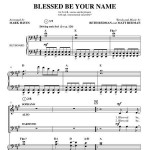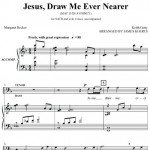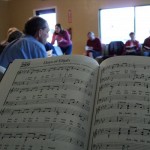Each one has a hymn: Blessed be your name
In two previous posts, I asked how singing can be edifying to the church and offered one example of how we have attempted to make singing more edifying by attaching the lyrics of the songs to our lives. (See my posts “Each one has a hymn” and “Each one has a hymn: Singing for edification.”) In two other posts, I explained how a brother shared how the song “Jesus draw me ever nearer” in his own life and in doing so edified the whole church and how a sister who had just been diagnosed with cancer (again) edified the church by sharing the hymn “Joy to the World.” In this post, I’m going to share another example of a song that was shared in our gatherings over the last few weeks. This time, it’s a song that I shared with the church… one two different occasions.
Last week, I was with a group of adults and teenagers serving people in Norfolk, VA area in Jesus’ name by working on their homes. Our crew chief, who had more experience with construction than the rest of us, was a great encouragement and help to all of us. Toward the end of one day of work, he got a phone call from his wife. She told him that she received the lab results of some tests that she had taken earlier. It turns out that she was being diagnosed with stage one breast cancer.
After we cleaned up our work site that day, we circled around our crew chief to encourage and prayer for him as he and his wife were getting ready to face this battle with cancer. As we were encouraging him, he encouraged us as well with his trust in God in spite of these circumstances.
I recommended that we sing “Blessed be your name” (by Matt Redman) together. So this is what we sang:
Blessed Be Your Name
In the land that is plentiful
Where Your streams of abundance flow
Blessed be Your nameBlessed Be Your name
When I’m found in the desert place
Though I walk through the wilderness
Blessed Be Your name[prechorus]
Every blessing You pour out
I’ll turn back to praise
When the darkness closes in, Lord
Still I will say[chorus]
Blessed be the name of the Lord
Blessed be Your name
Blessed be the name of the Lord
Blessed be Your glorious nameBlessed be Your name
When the sun’s shining down on me
When the world’s ‘all as it should be’
Blessed be Your nameBlessed be Your name
On the road marked with suffering
Though there’s pain in the offering
Blessed be Your name
Our crew chief wrote about this time together. This is what he wrote to encourage others:
“Today as I was hanging a storm door, I got a call from my wife confirming stage one breast cancer. My crew driver overheard the conversation and asked if he could share with our crew. I said yes, so he called the crew together and shared our story. Our crew closed circle, held hands, and offered up prayers; we then sang ‘Blessed Be Your Name’. We serve an awesome God who placed this crew in my path when I needed to be lifted up.”
After we returned home from our trip to Norfolk, I shared this story with the church here, and again we sang this song together. Once again, people shared how God had proved himself strong and faithful even in “the desert place.”
We’ve found that sharing songs like this in the midst of life as part of our circumstances and situations helps our singing to be more edifying than if we simply sang the songs without discussing the significance to our lives.
Each one has a hymn: Joy to the world!
In two previous posts, I asked how singing can be edifying to the church and offered one example of how we have attempted to make singing more edifying by attaching the lyrics of the songs to our lives. (See my posts “Each one has a hymn” and “Each one has a hymn: Singing for edification.”) In another post, I explained how a brother shared how the song “Jesus draw me ever nearer” in his own life and in doing so edified the whole church. In this post, I’m going to share another example of a song that was shared in our gatherings over the last few weeks.
One Sunday morning, we were talking about one of our sisters. A few weeks earlier, she had been diagnosed with cancer again, and the doctors had only given her six months to live. She had been struggling physically… although she was and still is very strong spiritually. Someone mentioned visiting her, so I called her. It turned out that she had just woke up, and she felt strong enough for visitors.
So, we all piled in a few cars and headed over to her house where we spent the next hour or so talking, singing, praying, reading Scripture, etc. Our intention was to encourage her and her two daughter who were taking care of her. Instead, we all ended up being built up in Christ.
Now, in the past, before she learned that her cancer had returned, she had always responded to times of singing and testimony with something like this: “I always have a praise for my Lord!” This morning – in spite of the cancer and the weak body – she also wanted to share a praise with us. Then, she asked if we could sing “Joy to the World” (by Isaac Watts) together. Yes, “Joy to the World.” It’s much, much more than just a Christmas carol. So, we sang…
Joy to the World , the Lord is come!
Let earth receive her King;
Let every heart prepare Him room,
And Heaven and nature sing,
And Heaven and nature sing,
And Heaven, and Heaven, and nature sing.Joy to the World, the Savior reigns!
Let men their songs employ;
While fields and floods, rocks, hills and plains
Repeat the sounding joy,
Repeat the sounding joy,
Repeat, repeat, the sounding joy.No more let sins and sorrows grow,
Nor thorns infest the ground;
He comes to make His blessings flow
Far as the curse is found,
Far as the curse is found,
Far as, far as, the curse is found.He rules the world with truth and grace,
And makes the nations prove
The glories of His righteousness,
And wonders of His love,
And wonders of His love,
And wonders, wonders, of His love.
There’s not much more to share about this example. In spite of her physical struggles and her sickness, this sister edified us with her faith in God and her continued desire to praise him!
Each one has a hymn: Jesus draw me ever nearer
In two previous posts, I asked how singing can be edifying to the church and offered one example of how we have attempted to make singing more edifying by attaching the lyrics of the songs to our lives. (See my posts “Each one has a hymn” and “Each one has a hymn: Singing for edification.”) In the next few posts, I’m going to share some examples of songs that have been shared in our gatherings over the last few weeks.
One morning, one of our brothers asked us to sing a song by Keith Getty and Margaret Becker called “Jesus Draw Me Ever Nearer (May This Journey).” This is a fairly new hymn (from 2002), and I did not know it.
But, my friend shared that he had been struggling with trusting God lately, and this song kept coming to mind as a prayer to God during those tough times. These are the words that we sang together:
Jesus draw me ever nearer
As I labour through the storm.
You have called me to this passage,
and I’ll follow, though I’m worn.[chorus]
May this journey bring a blessing,
May I rise on wings of faith;
And at the end of my heart’s testing,
With Your likeness let me wake.Jesus guide me through the tempest;
Keep my spirit staid and sure.
When the midnight meets the morning,
Let me love You even more.Let the treasures of the trial
Form within me as I go –
And at the end of this long passage,
Let me leave them at Your throne.
Knowing that God had used this song in my brother’s life, that he had sung it personally as a prayer for God to strengthen his faith, and that he had shared it with us in order to encourage us to trust God helped us all to focus on the words as we sang them.
After we sang, and really throughout the time that we were gathered together, people continued to refer back to the words of the song and our friend’s confession that he was struggling with trusting God. In fact, other shared about their own struggles trusting God.
As we turned to Scripture, we continually saw the theme of trusting God pop up in our conversations, which again reminded us of our brother’s song request.
If he had not shared how God had used this song in his own life, the lyrics would not have been as meaningful to us as a community. Not only did we understand better about what was going on with our brother, we could also see how God was working in his life to strengthen and encourage him, then using him in the same way in our lives.
Each one has a hymn: Singing for edification
As I said in my previous post (“Each one has a hymn“), Paul said that everything we do when we gather together with other believers should be done for the purpose of building each other up. In the context of that statement (1 Corinthians 14), he specifically mentions singing a couple of times.
So, I asked the question, “When we come together with other believers and when we sing, how do we sing in a way that edifies one another?” The “one another” part of that question is very important. Throughout that chapter – and in other places – Paul specifically differentiates between activities that edify ONLY the individual and activities that edify many. When we are with other believers, our focus is not to be on edifying ourselves, but instead our focus is to be on edifying others. How does that work with singing?
In this post, I’m going to share one way of using singing (hymns and other types of songs) to edify others. Then, in the next few posts, I’ll share a few specific examples.
In the middle section of 1 Corinthians 14, Paul explains that for something to edify others, they must understand what is being said, prayed, or sung. If a person does not understand something (for various reasons) then that person is not edified by it, even if the person speaking, singing, praying, etc. is responding to the Spirit in a way that edifies himself.
For many years, we have asked people to share a song that has been on their heart. We would sing the song together, and then move on to the next song. However, we wanted this to be a more edifying time.
So, a few years ago, when someone requested that we sing a song, we started asking a simple question: “Why do you want us to sing that song?” Usually, the person explains something that has happened in the recent past (sometimes the distant past) and how that particular song corresponds with what God was doing in that instance. In that way, the song shifts from a generic lyric written by someone we don’t know into something that has meaning both to the person and now to the community.
Often, after the person requesting the song explains the significance and after we sing the song together, others will then add their own comments regarding the song and its significance to their own life. Again, the song become even less generic and becomes even more relevant to all of us, knowing more about what our friends are going through.
By the way, there are times when someone (especially our younger or more quiet friends) will request a song simply because “it is one of my favorites.” We do not discourage that at all. In fact, others will often still discuss the significance of the part of the lyrics after we sing together.
Furthermore, as we sing multiple songs and as different people discuss the significance of the lyrics, we find a connection between many (or all) of them. That connection often carries over as we discuss a particular passage of Scripture or a topic together.
In this way, singing hymns and psalms and spiritual songs becomes much less about the music and much more about what God is doing in our lives as individuals, as families, and as a community in Christ.
Do you think that discussing the significance or relevance of the lyrics would be edifying to others? Would this make this song more understandable – at least, would it make the reason for wanting to sing that particular song more understandable? Can you think of other ways to make singing hymns, psalms, and spiritual songs more edifying to the church?
Each one has a hymn
The title of this post comes from 1 Corinthians 14:26 – “What then, brothers? When you come together, each one has a hymn, a lesson, a revelation, a tongue, or an interpretation. Let all things be done for building up.” (1 Corinthians 14:26 ESV)
In this part of his letter to the church in Corinth, Paul exhorts the believers to gather together in order to edify (build up) one another. While Paul mentions several different activities such as teaching, prophesying, praying, seeing, etc., he does not explain how to carry out those various activities. Instead, he focuses on the purpose of any activity that is done while gathered with other believers: edification. In fact, the entire chapter is focused on edification.
But, have you ever thought about how hymns and singing would edify others?
We know from other passages that singing can be directed only to God. For example, consider this statement (also from Paul) about singing:
[B]e filled with the Spirit…addressing one another in psalms and hymns and spiritual songs, singing and making melody to the Lord with your heart… (Ephesians 5:18b-19 ESV)
Notice that in the statement above, Paul says that singing is one result of being filled with the Spirit. But, he lists two different kinds of singing: 1) addressing one another in psalms and hymns and spiritual songs, and 2) making melody to the Lord with your heart. So, there is a type of singing that is prompted by the Holy Spirit which is directed from the individual directly to God. But, there is another type of singing which is also prompted by the Holy Spirit which is addressed to one another.
This second type of singing is the kind that Paul is talking about in 1 Corinthians 14 and which Paul says should result in edification (building up). In fact, Paul specifically says in 1 Corinthians 14 that those activities that are specifically between the individual and God but which do not edify others should not take place when we are gathered with others.
For example, in the passages below, Paul says that we should not pray, sing, or speak in tongues (without interpretation) – among other activities – if others are not edified:
What am I to do? I will pray with my spirit, but I will pray with my mind also; I will sing praise with my spirit, but I will sing with my mind also. Otherwise, if you give thanks with your spirit, how can anyone in the position of an outsider say “Amen” to your thanksgiving when he does not know what you are saying? For you may be giving thanks well enough, but the other person is not being built up. (1 Corinthians 14:15-17 ESV)
If any speak in a tongue, let there be only two or at most three, and each in turn, and let someone interpret. But if there is no one to interpret, let each of them keep silent in church and speak to himself and to God. (1 Corinthians 14:27:28 ESV)
Paul never says that the prayer, singing, or tongue speaking are invalid or not in the Spirit. Instead, he says we should only pray, sing, or speak in tongues (among other activities) in ways that are both understandable and edifying when we are with other believers.
Thus, when we are gathered together with our brothers and sisters in Christ, our singing is to God, but it is also to one another (i.e., “addressing one another”). Similarly, our singing is for the purpose of building one another up as much as it is for the purpose of praising God.
So, when we come together with other believers and when we sing, how do we sing in a way that edifies one another?
Most Read Post of 2009: A Megachurch in Jerusalem?
I’m out of town this week, so I’m linking to the most read posts on my blog from each year from 2007 to 2011.
The most read post on my blog from 2009 was “A Megachurch in Jerusalem?.”
Please take the time to read that post and the comments from my readers.
Thank you, and I’ll “see” you again soon.
If you won’t gather the way I think you should, then I’ll find a group who will!
The title of this post has been the (sarcastic) point of several of my blog posts, including one of my favorites called “A Cup o’ Joe or a Cup with Joe.” (By the way, if you jump to that post, make sure to read the comments. Those are some of the best comments on my blog… ever.)
Now, Kurt at “church then and now” has written a post on the same topic called “A Holiday Disaster – A Parable.” Kurt not only begins his post with a humorous “parable,” but he also continues by examining the problem of requiring others to be and act the way we think they should.
Here is Kurt’s parable:
It was one of the worst possible family gatherings imaginable. People showed up late. Aunt Mary was supposed to bring the salad but forgot. Uncle Sam was in charge of the meat. It was overdone a tough. Some of the cousins got into a fight with lots of name calling and even a few hard shoves. The dessert…we always have apple pie. This year we had chocolate cake. It just isn’t the same.
I was a bit frustrated, maybe even angry. Everything seemed different. I didn’t like it. Mistakes, change…I don’t like it at all. My first inclination, my knee jerk reaction, was to find another place to go for my next holiday meal. I am having a hard time. I don’t like this a bit.
I heard that a house down the street has nice people, a happy atmosphere, and wonderful food, including apple pie. I think I will go to that house next time.
It sounds funny when it’s a family reunion… but it seems the church is so much like that. We accept one another and fellowship with one another based on our levels of agreement instead of basing everything on our mutual relationship with God in Jesus Christ.
How much different this “family reunion” we call church would be and would appear to others (especially outsiders) if we accepted one another as God has accepted us in Jesus Christ.
Don’t miss the remainder of Kurt’s post. He has some good things to say in regards to accepting one another as God’s family.
A day at the beach with the church
Yesterday (Sunday, May 20, 2012), we spent a day at the beach with the church. We’ve done this regularly (usually once in the summer) for the last few years. One of the families will plan the outing and those who can will join them at Wrightsville Beach, near Wilmington, NC.
It’s about a 2 1/2 hour drive from our house to the beach. We left just after 7:00 a.m., picked up a few friends, and drove down. I think we spent about 6 hours hanging out, talking, playing in the sand and water, playing volleyball, and even paddling around in a kayak.
It was supposed to rain all day. But, it never rained! It was overcast until about 2 p.m., then the sun came out for a beautiful and hot afternoon. (Yes, I’m sunburned.)
This year, as a bonus, I was able to meet (in real life) some friends who I originally met here on this blog: Randi (and her family) and their friend Chris. Randi comments here frequently, and Chris has commented in the past. I was able to talk with them for a few minutes, but usually one of my other friends had them cornered and chatting away.
I even when on a run on the beach with two guys. It was first time running in the sand, and the first time running bare foot. (We found out that it’s 1.75 miles between the two piers on Wrightsville Beach.)
This is one “tradition” that I hope we can continue for a long time.
Replay: Learning to live dependent on God and interdependent on one another
Four years ago, I wrote a post called “Interdependence.” The post was written after a weekend in which I witnessed a man who refused to admit that he needed help and refused to accept help when it was offered (although it was clear that he did need help). That same weekend, I witnessed a friend admit that she needed help and other friends offer help. It reminded me that we are both dependent on God, and interdependent upon one another – as God often works through his children to help one another.
I hope this post is as encouraging to you as the actual experiences were to me.
———————————–
Interdependence
As followers of Jesus Christ, we are both dependent upon God, and interdependent upon one another. Unfortunately, society teaches us to be independent – neither dependent nor interdependent. We’re taught to learn for ourselves, fend for ourselves, care for ourselves, earn for ourselves, and do for ourselves. We’re taught not to admit that we need help from anyone nor to accept help from anyone. This is the nature of American society, but it is not the nature of the follower of Jesus Christ – he or she has a new nature.
This point was driven home for me last Friday. Our family arrived at the event location for the North Raleigh / Wake Forest Relay for Life around 5:15 p.m. We were supposed to drop off our canopy, chairs, tables, etc. – which we did. The committee was supposed to pick up our stuff and take it to our site – which they did. I was supposed to park my vehicle – which I did – while my family walked to our site – which they did. Everything was going according to plan.
Except… as soon as I parked our van, it started to rain. It wasn’t a slow sprinkle, it was a gully-washer – at least, that’s what we called it in Alabama. The entire time that I was walking – running – to our event site, I could picture my family standing in the middle of a muddy field getting drenched by the rain. Imagine my surprise when I reached our site to find that two teenagers from a nearby site had come to their rescue! The two young men were helping my wife set up the canopy, and they had pulled all of our equipment under the canopy. Those two teenagers were my heroes that night! After I arrived, I helped them finish setting up the canopy, and we stayed as dry as we could while the rain continued.
Not long after our canopy was set up, another team arrived at the site next to ours. The team – at this time – consisted of a mother, her teenage daughter, and two or three more teenage girls. My family helped them spread their canopy over their stuff. We offered to help them raise their canopy, but they said they didn’t want to raise it yet. Instead, they stood under some umbrellas and waited for the husband to arrive.
When the husband arrived, I again went over and offered assistance. I told him that some boys from a neighboring site had helped us, and that we would love to help them set up their canopies – they actually had two. He said no. He didn’t need the help, but thank you anyway.
We watched and listened as he struggled to raise the canopy in the wind and rain. He was obviously getting frustrated because his family was not doing things the way he thought they should be done. They often spoke loudly – shouted – at one another as they tried to raise the two canopies and keep their stuff dry at the same time.
When the shouting had subsided for a moment, and when tempers seems to settle a little, I again walked over and asked if I could help. He said… and I quote… “No, we like to fight while we do this.” I told him that I would be glad to help, if he decided he needed anything. Then, I walked back to my canopy.
As I think back over this encounter, I recognize the church acting in this stubborn, independent manner many times. It seems that even believers have the attitude that they can do everything by themselves and they don’t need any one’s help. It often appears that many feel that asking for help or accepting help from others is a sign of weakness or spiritual immaturity.
This is such a travesty and a misunderstanding of what it means to be brothers and sisters in Christ. God provides us with relationships with one another so that we can love one another, accept one another, help one another, give to one another, and serve one another. We cannot make it through this life alone – at least, we cannot live the way God wants us to live alone. We need God, and we also need one another. Independence may be an American virtue, but it is a Christian vice.
The next day, Saturday, my family was helping one our young, single, female friends move. (I mentioned this briefly in my post called “Weekend of Service“.) A few weeks before, this young lady began telling people that she needed help finding a place to live. Another family asked if she would like to live with them. They shuffled their boys’ bedrooms so that our friend could have a room to herself, and Saturday afternoon, a bunch of us got together, packed up her belongings, and moved her into their house.
After unloading all of the boxes, another friend brought dinner for everyone. While I was sitting there enjoying a homemade meatball sub, I remembered the encounter with the man who refused to acknowledge that he needed help, and refused to accept help when it was offered. What a stark contrast to my friends, one of whom acknowledged that she needed help and accepted the help that was offered, and a family who was willing to put their own comforts aside and offer help.
This is a beautiful picture of God’s family. Brothers and sisters recognizing their complete dependence upon God and willing to live interdependent upon one another. That evening, I couldn’t help but thank them and praise God for the example of community that he had shown me that day.
Preparation, Spontaneity, and the Work of the Spirit when we Gather
Eric at “A Pilgrim’s Progress” has been writing a lot of good, thought-provoking posts lately. I really enjoyed his post called “We Really Can Trust the Holy Spirit.” His post is about the work of the Holy Spirit when we are gathered together with other believers – whether it is a gathering that was planned or unplanned.
There is often disagreement among the church today about what role “preparation” and “spontaneity” should play when we gather together. Should we plan what we are going to say (i.e., “when you come together, each one has a hymn, an instruction, a revelation, a tongue, an interpretation”)? Or do we speak when the Spirit spontaneously directs us to speak (i.e., “and if the Spirit reveals something to someone sitting…”)? Both passages that I paraphrased are in the same context in 1 Corinthians 14:26-40. So, both preparation and spontaneity seem to be in view in Paul’s instructions.
This is what Eric says:
I’ve found that the Spirit tends to use our planning/preparation in the gatherings, but this may be in ways that we could not predict. For example, I plan to study over a passage of scripture tonight. I may mention it tomorrow or I may not. I really don’t know. The Spirit will make it clear to me tomorrow whether or not I should speak about it.
It is fascinating the way the Spirit frequently brings things together as Christians gather. It happens time after time in our small fellowship. One person will read a passage that relates exactly to what someone else is going through in life. We might sing a song that has a connection to what someone else is dealing with. The list goes on and on.
So, do we prepare before we gather with other believers? Sure. Do we expect and depend on the work of the Spirit when we gather together? Yes. (Although, I do think there is a problem when someone studies ONLY to have something to say when the church gathers.)
Like Eric said above, as the Spirit guides us outside of our times together, he can also guide us during our times together. We may come together with other believers expecting (and even prepared) to say something or teach something, but that may not be what God has planned. So, we trust him to know when to speak as well as what to speak.
Like Eric said, we really can trust the Holy Spirit.










